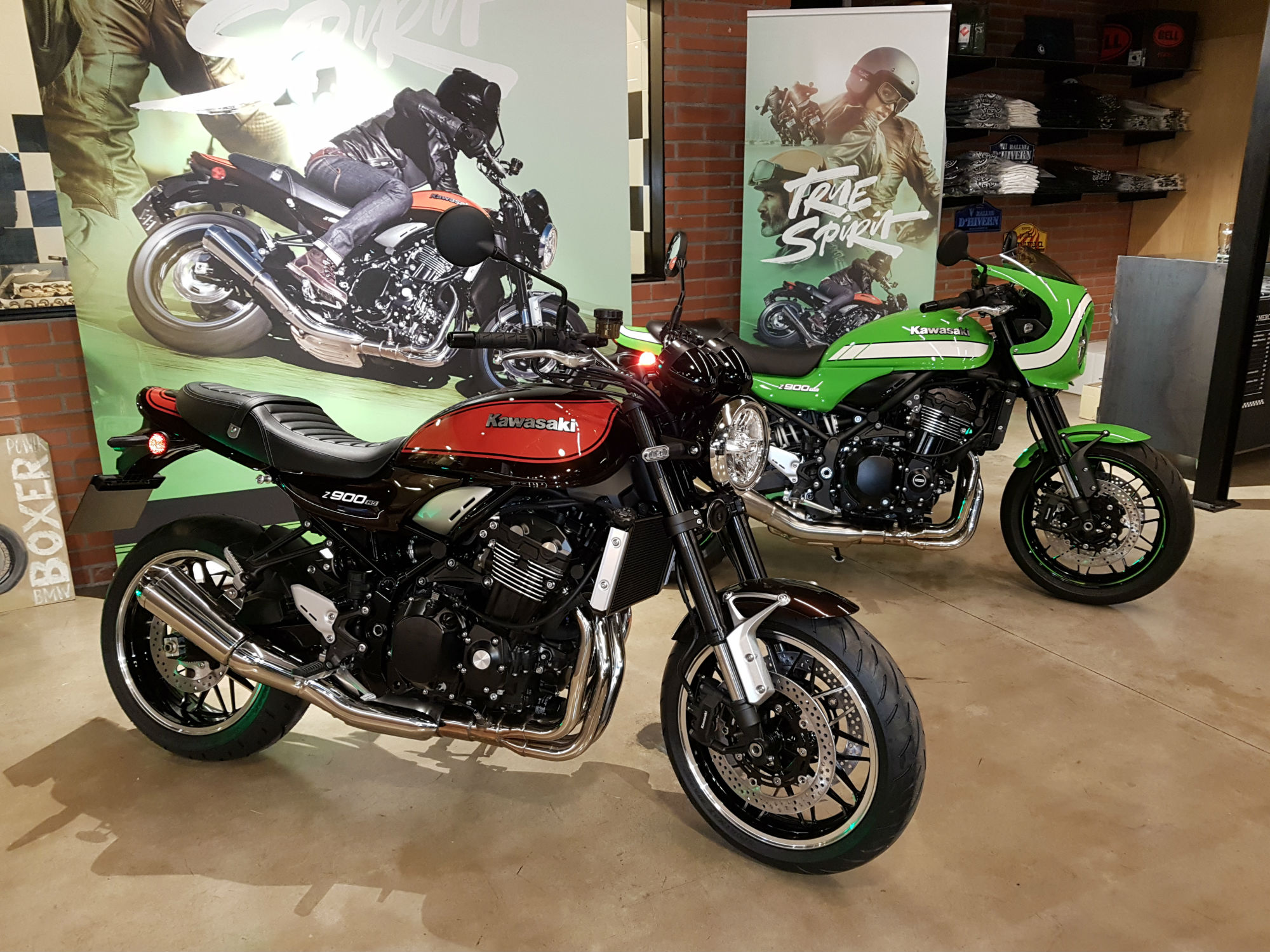
VISORDOWN Editor Steve Farrell is on the launch of the Kawasaki Z900RS in Barcelona. Here are his initial impressions after a 45-minute evening ride to dinner.
‘If you’ve paid any attention to new bikes being shown this autumn, you’ll probably know about this. It’s the Kawasaki Z900RS, based on the Z900 but re-imagined as 1970s Z1. Well, a kind of modern interpretation of one, anyway.
‘But it’s higher spec than the Z900, with radial-mounted front brake calipers and added traction control, with two levels of intervention plus off.
‘It’s got a “fundamentally different chassis” to the Z900, according to Kawasaki – still tubular steel but with the top tubes closer together to accommodate the new teardrop-shaped tank and the sub-frame straighter to make for a more horizontal rider and pillion seat.
‘The 948cc in-line-four has been detuned. Claimed peak power is now 111hp at 8,500rpm instead of 125hp at 9,500rpm. Peak torque is down very slightly, from 72.7lbft to 72.6lbft, but now occurs at 6,500rpm instead of 7,700rpm. Kawasaki says the pay-off is stronger low-to-mid-range torque and that seems to be the case. First gear has also been shortened.
‘The result is a pretty aggressive, muscle-bike-like torque delivery from almost the moment you open the throttle in first. Slightly snatchy even, requiring a little bit of wrist recalibration.
‘By third gear it still pulls from as low as 2,000rpm but without the torque pouring in quite so rapidly the initial throttle response reveals itself as smooth.
‘Fundamentally different or not, the chassis shares the compliant, easy-to-dominate character of the Z900, and the suspension the same sense of reassuring balance and composure (at least on our fairly relaxed coastal ride to dinner). It’s on 41mm upside-down forks, adjustable for preload and compression and rebound damping, and a horizontal gas-charged shock, adjustable for preload and rebound damping.
‘Some people have questioned why it doesn’t have twin shocks like the original Z1. Kawasaki had a straight-forward and plausible answer: for better handling.
‘Overall the effort to mimic the Z1 is impressive though. The clocks are big, round dials with chrome surrounds and white on black numbers. They look just like a Z1’s, except of course for the digital display in the middle, with information including a gear indicator.
‘Glance down while riding and it creates the impression that you could actually be on a Z1. Even the numbers on the dial are the same font, and the illuminated ‘N’ neutral light a faithful recreation of the original.
‘The brown/orange paint on the tank is delicious. The more I look at this bike, the more I like it.
‘The riding position is more upright than the Z900’s. It’s not bolt-upright – there’s still a little bit of a reach to the bars – but you’re not hunched over them, as you are on the Z900.
‘There’s also the Z900RS Café, with slightly lower bars, café racer fairing and seat and green paint (It’s the bike behind the Z900RS in the picture above, taken at the launch, and in also in the walk-around video from EICMA in Milan, below). It looks possibly even better. Disappointingly, it doesn’t look like we’re going to get to ride it on this launch, unless Kawasaki plans to surprise us.
‘They’re not due to go on sale until March 2018, so there aren’t enough around yet. The Z900RS is due to hit dealers next month.
‘The Z900RS costs £9,899 in black, £10,099 in green or £10,199 in the brown/orange scheme which best mimics the Z1. The Z900RS Café is £10,349.
‘The seat seems a little higher than I might have expected. It’s 835mm according to the specs list. I’m 5’9” and could get both feel flat on the ground, but not with much room to spare. A low seat option is available.
The seat also seems quite firm. It was fine for 45 minutes but I suspect it could feel a little austere after a couple of hours. I’ll find out tomorrow on a full day’s riding, after which I’ll bring you a full review’
source:-.visordown




